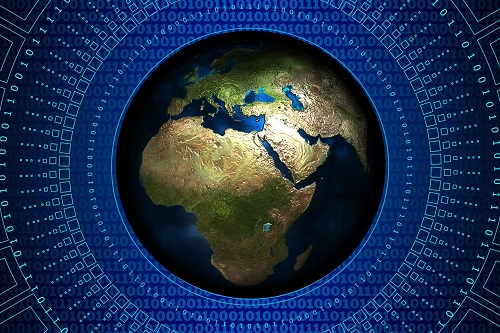By
Zeeshan A. Shah
The future has imploded into the present. With no nuclear war, the new battlefields are people’s mind and souls. Mega-corporations are the new governments, computer generated info-domains are the new frontiers. Though there is better living between science and chemistry, we are all becoming ‘Mind-slaves’. The computer is the new cool tool. Though we say ‘All information shall be free’- it is not. Information is power and currency of the virtual world we inhabit. So we mustn’t trust authority- we must question it. Just like Cyborgs. Cyber-punks are the true rebels. Cyber-Culture is coming under the radar. An unordinary society, an unchained alliance with the tech-world and a world organized descent. Welcome to the Cyber-Corporation- The New World.
We live in a different universe than our grandparents. We are out in the modern wasteland with no real religion – no true religion at all. Except power, progress and prosperity, at all costs. We see a modern primitive – a human being with savage instincts and a lethal mind in the form of distorted mind-culture. Media is kingpin. The future of fun is computer crime, fantasy machines and secret codes. It’s a shock to the system. Turn on the brain – activate the senses and everything you love has become complicated.
In 1950, there were about 2.5 billion people; today we are 7 billion people. By 2050, the population is projected to top 9 billion. By 2050, nearly 40% of global youth will live in Asia- another 50% will live in Africa.
So what will the world be like for our children?
People will probably live better and longer lives. Global GDP will likely triple; natural resource consumption will double. And the effects of climate change–somehow inevitable–will be felt more strongly than they are today. Sea levels will be higher, weather more erratic, biodiversity less, and water and natural resources likely scarcer. People who live in poverty will be especially vulnerable to natural disasters, land degradation, water shortages, and shocks in food production. In Pakistan alone, over 200 million Pakistani people will be water-deprived in a decade.
The stress on our planet has been immense. Human beings have dramatically altered the climate, changed the chemistry of the oceans, and triggered mass extinctions. The impact has been so great as to define an entirely new geological era?—?the turbo charged ‘Homosapien’ world, with a “great acceleration” of population, economic growth and natural resource consumption since the 1950s.
Can the next generation capture the benefits of growth without incorporating the element of loss? Will technology allow us to decouple growth from natural resource consumption? We can’t say for sure. Our best hopes today are human ingenuity, rationality, and values. That comes down to education and the steps we take now to ensure all children are educated and socialized to respect the planet.
Academia is not respected as it should be. Where our teachers are considered a liability rather than assets. Our children drink bottled water controlled by corporate giants in plastic bottles that do not decompose in over 50 years. Our rivers are sold to bidders for business profits and our oceans are dumped with nuclear waste and sewage that kills. Access your new state of mind and let it take some discipline. Think what is most precious- and the answer is “life”.
Our Rights to life are compromised. But we can still save the children. Or can we?
By the year 2040, renewables will finally have won the global energy race. The prices of coal and gas will have dropped significantly, but this will not derail the de-carbonization of our energy systems. The Paris Agreement is a two-step process: countries must first sign the Agreement, and then indicate their consent to join and be legally bound by it. The ratification signatures of at least 55 countries – representing more than 55% of global carbon emissions – are required for the deal to formally apply from 2020.
Why do poor people die often? Simply because rich-big corporations do not cover insurance or safety protocols at work. Coal miners in emerging nations carry one of the highest job-casualty rates worldwide mainly because of the social status as low-income and also by living conditions. Not many nations in Asia and Africa care of human safety when it comes to corporate profits. These are the kind of facts our children need to know in schools- about social justice.
For example, here in Pakistan, we just might be sitting on the world’s biggest coal reserve that can change the course of history for the country. But failure to adapt the KYOTO protocol on sustainable development will destroy the country due to bad governance and human error leading to death-counts. Unless we follow security and safety protocols, we may end up with thousands of human casualties just on account of coal-mining alone. Like a human-death tsunami. Helping with that transition is an especially important challenge because most of the population growth in the coming decades will be in developing countries. More life but at the cost of more death.
On education, the question remains. Will their education systems prepare the next generation to mitigate and adapt to the changing climate? Can they foster a generation of citizens and policy makers that have the values and skills to manage natural resources sustainably? Will their schools and universities support the science, technology, research and innovation societies will need to cope with climate change?
Climate change is a human-induced problem?—?in large part a function of the number of people on the planet, their values and skills, and technology. Can education programs alter the trajectory? There are 4 ways to help:
First, create an education emergency. Education change shapes demographic change. Reaching SDGs would likely result in a global population of 8.5 billion in 2050 instead of 9.1 billion. That is because educated women tend to have fewer, healthier, and better educated children themselves. Education also helps people adapt to climate change because it enhances abilities to absorb information, calculate risk, prepare for climate shocks and recover from them.
Second, strengthen STEM education. This will help young people understand physical changes in their environment, and give them the tools they need to invent, innovate, and adopt technology. Let’s aim to cultivate a generation of scientifically literate secondary school graduates. Let’s support technical and vocational education and training systems that train skilled professionals to serve a “green economy”; and universities to produce leaders in the fields of climate science, engineering, natural resource management, and environmental studies.
Third, support environmental education as a standalone subject and/or as a cross-cutting theme in the school curriculum and in teacher training programs. Cultivate the values and knowledge young people can use to live more sustainable lives?—?and to live with concern for animals, plants and the world of nature. Stimulate their wonder about the natural world and concern for the health of the planet.
Fourth, build schools that reflect environmental principles–schools that are energy efficient, that spark children’s imagination and use of renewable energy, clean and efficient use of water, and opportunities to interact with the environment. Schools should be strong enough to stand up in extreme weather events, and in high risk areas potentially double as emergency shelters.
We are moving fast but we are not moving sensibly. Globally, we are living in a pocket universe-like a time-warp. Like a sci-fi story with a hope for glory and redemption in a world of oppression. Climate change-needs a mind-change. And we somehow are unable to think human carrying obsessive desires to damage environment, with an absurd disregard for humanity.
Climate change will kill more people than wars in coming decades. Why make up a lie and believe it is true? How much do we know? Every day we know less.
Zeeshan A. Shah
Zeeshan Shah writes on Global Affairs, Climate Change, Governance and Public Policy. He is a banker and a broadcaster.
The writer is a Director at CNNA Pakistan – a leading advocacy institute and is an expert on International Relations and Education Policy.
With over 150 publications in major local and global social media & newspapers, he has been instrumental in producing over 5,000 radio broadcasts aired globally.
A thought leader, environmental journalist, media broadcaster and a change maker with an acute focus on development affairs & education for Pakistan.



Children and mothers in Somalia need your help.
Tks for your valuable inputs here. Yes Education is the next big thing in all aspects of life on earth. Ignore the cliches . Yet we stand far from the end goal. Keep putting in your comments and share this article further to our likeminded friends. Tks Ank
Hey Zeeshan, I loved that you emphasized education in this post. Indeed, in order to protect the future, strengthening the resilience of the students (who are the real future) is the most sensible thing to do. Strong nature literacy and nature connection programs to develop a positive relationship with the natural environment. Check out this resource:https://www.outdoortopia.org/blog/bringing-classroom-education-outside-in-our-schools?fbclid=IwAR1J-BeQmMG0gHBscvhrlrVS2xu_Hbtdk2X2UCXdeOcYJ1-YvY2rbxqDNfU I am also working toward developing education programs to do just this. Thanks for writing this important article